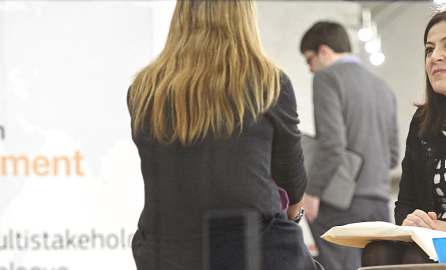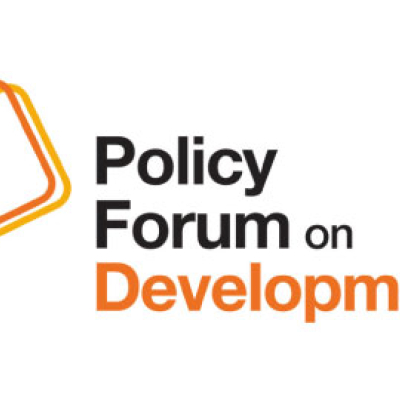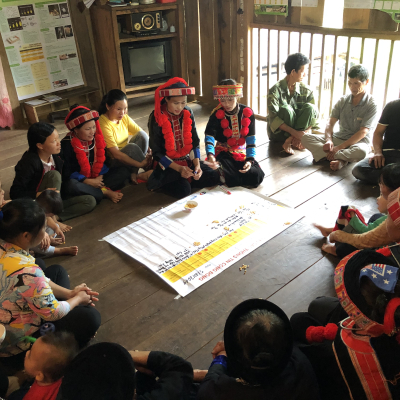The Policy Forum on Development (PFD) provides a platform for members of civil society, local authorities, the private sector and European institutions to shape development policies together. The first European Regional Meeting in Ghent in January 2018 provided a chance for a discussion on what works – and what doesn’t – laying the groundwork for new partnerships in pursuit of shared objectives.
The adoption of high-level policy documents throughout 2016 and 2017 by the European Union, including the EU Consensus on Development and the Urban Agenda for the EU, provided a backdrop to the conference.
|
Following on from regional consultations, the PFD will be holding its 6th Global Meeting in March of 2018, bringing together stakeholders for a discussion of development policy. Watch the recap video for the Ghent PFD here. |
With over 100 participants from Europe and partner countries, panels covered everything from aligning policy with the Sustainable Development Goals (SDGs) to how to create an enabling environment for all actors involved.
Capacity4dev caught up with some of the participants during the two day conference to find out more about the work they do – and how the PFD contributes to achieving a joint vision for the future.
Views from the Middle East and North Africa
“These meetings are very important for exchange – we need to update each other on where we are, how we think, and what the new developments and reactions are… but most importantly, how we can work together to face these challenges,” said Ziad Abdel Samad, Director of the Arab NGO Network for Development and member of the PFD task team for the Middle East and North Africa region (MENA).
Speaking to Capacity4dev, Abdel Samad voiced his concerns about heightened tensions in the region – from civil wars to flows of migrants and refugees – and how working with Europe as a neighbour and partner can contribute to finding peaceful and sustainable solutions.
“We won’t always be living in crisis – we’ll move past it, so we need to ask what the role of civil society in rebuilding societies and their fabric is”
“The region is passing through a complicated and difficult moment of transition… in some areas it’s going smoothly and easier than in other countries, but in some places it went in a dramatic way,” he said.
For Abdel Samad, the Forum was a moment for civil society to build solidarity and work towards common objectives – the interconnected nature of the global economy and a rise in climate impacts mean that any solution will require a concerted effort.
The PFD’s first Middle East and Neighbourhood South Multi-Stakeholder Meeting was held last October as part of the regional consultations to inform policy, in turn feeding into the discussions held in Ghent. For Abdel Samad, this served as an important space for engaging the EU in the promotion of democratic values and a respect for human rights amid turbulent times.
“We won’t always be living in crisis – we’ll move past it, so we need to ask what the role of civil society in rebuilding societies and their fabric is,” he said. Dialoguing with local authorities, NGOs and EU counterparts provided for a better understanding of shared interests, along with insight into how the European Commission’s reformulation of neighbourhood policy will shape the work being done on the ground.
Watch Ziad Abdel Samad discuss the need for European partnerships with actors in the MENA region and the role the PFD plays in cooperation:
Reflecting on the conclusions of the regional meeting, Abdel Samad highlighted some of the key recommendations: a more active political engagement from Europe in the MENA region, backed by increased policy coherence and transparency in objectives and implementation. Participants further provided recommendations to governments of the region, presenting the need for more democratic institutions, transparency, and a greater enabling space for civil society.
Abdel Samad explained that while the 2030 Agenda for Sustainable Development and the SDGs represent important milestones, there is still a need to refocus development paradigms on productivity, financial, and economic models – while continuing to ensure a rights-based approach.
Local authorities in decentralised cooperation
Members of local authority organisations served as a counterpoint to civil society attendees, affirming the need for collaboration through decentralised cooperation. Drawing on their own experience in different policy fields – such as waste management, civil registry, and mobility infrastructure – PFD participants affirmed that exchanges with partner countries’ local governments yield strong results for both sides.
“Seeing municipal representatives here, together with entrepreneurs, research institutions, and all these other partners, aiming at a multi-stakeholder approach to achieving the SDGs, really makes me happy,” said Jessie Post, project manager at VNG International.
“We see that in many of our projects... that the first step towards recovery is usually at the level of the local administration”
VNG International – the international cooperation agency of the Association of Netherlands Municipalities – works both on advising Dutch municipalities on international affairs and collaborating with municipalities and associations of local governments in partner countries. Funded by the EU and the Dutch Ministry of Foreign Affairs, among others, VNG integrates Dutch local government expertise in over 50 programmes across the world – and frames a municipal focus within the context of international agendas, such as the SDGs.
From capacity building efforts to land management, Post described the real impact that working with local governments can have. “We see that in many of our projects – some of which are in very fragile states, after wars or natural disasters – that the first step towards recovery is usually at the level of the local administration,” she said.
“We work in South Sudan, for example, and we see that after severe societal unrest, many of the basic services need to be put back into place so that people have a decent life again – which is what we’re aiming for, in the end, in all our programmes. It’s to help these citizens get the better prospects.”
While VNG has a presence in several fragile contexts, Post was quick to tell us about the wider range of municipalities where they are active, including in countries transitioning to higher levels of development. Having previously worked as the organisation’s programme manager in Benin, she drew on her own experiences with land management projects to explain what this process looks like in practice.
Post explained that VNG International’s and PLATFORMA’s CONNECT project – a mechanism to identify and link requirements from municipalities in partner countries to skill sets and experiences in European ones – allows for skill alignment when developing projects.
While many of the exchanges include a component on resource mobilisation, Post emphasised the importance of softer capacity building, too. “It’s not all about finance,” she said. “A lot is also about understanding what your core responsibilities are as a local government and getting things right with your citizens and council.”
Watch Jessie Post talk about VNG international’s role in decentralised cooperation and land management in Benin:
“We always hear back that it’s a great moment of reflection since it also raises questions that you may have forgotten about as a European local government,” she added, when asked about takeaways for European local authorities engaged in the programme.
In Cambodia, for example, a human resource management training given by an Icelandic mayor was opened to both the municipality’s staff and its politicians, leading to more consensus on the priority needs of the municipality. The Icelandic mayor realised that the mode of joint-trainings had never been done in her own municipality, and implemented similar trainings on her return home.
“I have the impression that a municipal focus is coming back on the EU level; there’s renewed energy, renewed interest in city-to-city cooperation and colleague-to-colleague set ups,” Post said.
“But it also requires some financing to work. Ideally, capacity-building efforts can be supplemented by grants or loans for hard investments. I am confident that with the newly established External Investment Plan and discussions on the new Multiannual Financial Framework there will be new openings and windows of opportunity – but it’s a work in progress.”
Private sector engagement
No discussion on development would be complete without contributions from the private sector. An acknowledgement of businesses’ central role in creating jobs and driving innovation was present throughout the two day conference, complementing perspectives from trade union representatives and employer associations.
“We have so many young people, especially in Africa, looking for a job – and it’s only the private sector that can really produce those jobs,” said Marie Gad, Chairman for BusinessEurope’s development working group. Pointing to examples of private sector involvement in finding solutions to fighting malnutrition, purifying water and renewable energies, Gad explained that there is no way of reaching the SDGs without investment.
|
As an example of what civil society partnering with the private sector can look like in practice, Gad described a collaboration that the Confederation of Danish Industry – a member of BusinessEurope – has played an active role in. The multi-sectoral partnership aims to produce affordable nutritious yogurt for the Ethiopian market, in line with a SDG focused approach. For more information on the partnership, see the promotional video here. |
“Our advice to companies is that there are opportunities in the global goals, but it also means integrating sustainability into their corporate agenda. ”This said, Gad was clear on the need for coherence in companies’ approaches to development to ensure that they are not merely engaging in greenwashing. “You can’t try to develop a product to combat malnutrition on one hand and create a lot of pollution on the other. That doesn’t really work, and will be damaging for the company in the long term,” she said.
Civil society criticism of corporate exploitation – from low wages to destructive environmental practices – is nothing new. “There are problems in the world where private companies have had a role to play… It’s important that civil society is there to see the problems and talk about them,” Gad said. “Accountability is important, but focusing on it too much drives companies away.”
For Gad, there is a need to strike a balance between an enabling business environment and corporate responsibility – something she believes can be done through cooperation. “I would like to encourage civil society organisations to work with the private sector and to try to ensure accountability in this way,” she said.
Watch Marie Gad discuss the SDGs and how different partners are coming together in creating a sustainable, nutritious yogurt for the Ethiopian market:
This article was written by Craig Hill, Journalist and Content Editor at Capacity4dev, with input from DG DEVCO.








Log in with your EU Login account to post or comment on the platform.